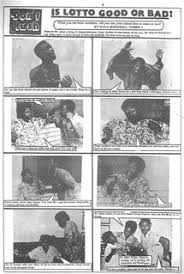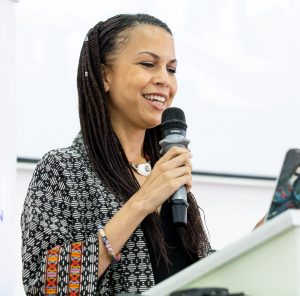Call for Nominations
The Boahen-Wilks Prize Committee would like to announce a call for nominations for the 2020-2021 Boahen-Wilks Outstanding Scholarly Article Prize. Articles and book chapters published in 2020 and 2021 are eligible. The prize is not restricted to only GSA members; works by any scholar in the area of Ghana Studies may be nominated. We also welcome self-nominations. The Prize winner will be announced at the GSA Business Meeting at the 4th Triennial Conference in Tamale in July 2022 and posted on the GSA website.
Submit the nominated article and a statement explaining why the article merits consideration (no more than 300 words) to boahenwilksprize@gmail.com
For additional information or questions, please contact Nana Yaw Sapong Boampong at: boahenwilksprize@gmail.com
About the prize
The Boahen-Wilks Outstanding Scholarly Article Prize is awarded by the Ghana Studies Association to recognize scholarship that best exemplifies the rigor, innovation and interdisciplinary nature of Ghana Studies. The prize is named in honor of two pioneering scholars—Albert Adu Boahen and Ivor Wilks.
The Boahen-Wilks Prize is open to journal articles and book chapters on Ghana. Nominations can come from any discipline, including history, anthropology, art history, sociology, political science, international relations, developments studies, and performing and visual arts.
2020 Prize
The winner of the 2020 Boahen-Wilks Prize is Jennifer Hart for her article “Of Pirate Drivers and Honking Horns: Mobility, Authority, and Urban Planning in Late-Colonial Accra” published in the journal, Technology and Culture.
Hart’s is a beautifully crafted paper which reminds us that rather than merely adopting or appropriating a piece of technology – like the bone-shaker – within a Western cultural framework, African entrepreneurs and urban residents redeployed these technological objects for their own purposes, often undermining colonial expectations, defying regulations, and reshaping the city in ways that were meaningful to them.
These resulted in anxieties and contentions, as colonial authorities tried to take control of Ghanaians and Ghanaians attempted to wrest control of their lives from the colonial government. Thus, this work also highlights city mobilities and the centrality of movement, which signifies growth, circulation, connection on one hand, and restriction, control, exclusion, immobility on the other hand. We also read the need for governance, regulation, planning, intervention, and management, resulting in ordinances such as the 1894 Town Councils Ordinance and the 1934 Motor Traffic Ordinance.
In the end, what we have is the making of a distinctive Accra culture, a place where vehicles, motor law enforcement, drivers, urban planning, transit stations, passengers and goods are in constant negotiation. [Read the full statement here.]
Honorable Mention: Alexander Eduful of Sunyani Technical University in Ghana titled ‘Reconsidering the entrepreneurial city in an African context: Accra’s shopping malls’ development and the new private sector actors in a neoliberal Ghana’ published in Geoforum.
Eduful offers an intriguing analysis of the positionality of the Ghanaian middle-class in the making of an entrepreneurial city. Based on his finding that local private developers relied on their accumulated social and cultural capital to connect with global partners, he argues that these local-global connection replace the private-public partnership that supports similar developments in global North contexts. This paper engages a subject—the many faces of urban entrepreneurism in a neoliberal context–that is not often salient in Ghana Studies literature but which is evident in everyday economic and social life in the country. We recommend Eduful’s article for its innovativeness and promise to provoke future research.
Prize Committee: Nana Yaw Boampong Sapong (Chair), George Bob-Milliar, Ben Talton, and Nana Akua Anyidoho
2019 Prize
 The recipient of the 2019 Boahen-Wilks Prize is Joeva Rock for her article, “‘We are not starving’: Challenging Genetically Modified Seeds and Development in Ghana”, published in The Journal of Culture and Agriculture.
The recipient of the 2019 Boahen-Wilks Prize is Joeva Rock for her article, “‘We are not starving’: Challenging Genetically Modified Seeds and Development in Ghana”, published in The Journal of Culture and Agriculture.
This fascinating article provides an interdisciplinary story of the history, politics and science behind the debates on GMOs in Ghana. By analyzing discursive narratives of donors, activists, officials and scientists as well as Ghana’s history of agricultural commercialization, the author demonstrates how the county’s relative good standing in food security indicators influences and shapes how Ghanaians talk about GMOs. Rock’s ethnographic research offers a deeper level understanding of the views of activists and officials and scientists than is available from media reports, moving past narratives of GMO resistance to show the social realities – concerns about representation, modernity and sovereignty – in which GMOs are embedded.
“We are not Starving” uses the author’s interaction with Susie to introduce the problem (the character of public response to GMOs) and argument (both Ghanaian scientists and GMO activists are unsatisfied with donor-imposed constructions of GMO-related realities). “Greening the Dark Continent” points out “donors’ neoliberal positioning that overlooks the structural causes of poverty and insufficient food access,” and blames marginalized communities for their predicaments in ways that invoke ideas of Africa as the dark continent. The next sections place GMO developments in Ghana within “A History of Agricultural Modernization.” Thereafter, “Ghanaian Food Sovereignty Activism” points out how food sovereignty activists in Ghana directly challenge discourse of the African continent (and African farmers) as deficient and unequipped for modernity. “Scientific Entanglements” describes a similar stance among Ghanaian officials and scientists doing GMO-related work. Although entrenched in international donor/development networks, they critique the discourses and practices of those very donors. Rock concludes by reiterating that both activists and scientists and officials share a desire for sovereign agricultural science and development.
This is an empirically and theoretically rich article that provides great insights into a contested topic in Ghana. It does an excellent job of contextualizing the core issues. It places Ghana at the center of analysis, and makes a significant contribution to Ghana Studies.
Joeva Rock is Visiting Research Scholar in the Department of International Studies at the University of San Francisco.
Prize Committee: Gretchen Bauer (Chair), Isidore Lobnibe, David Donkor and Ben Talton
2018 PRIZE
 The recipient of the 2018 Boahen-Wilks Prize was Esther de Bruijn for her article, “Sensationally Reading Ghana’s Joy-Ride Magazine,” which was published in The Cambridge Journal of Postcolonial Literary Inquiry.
The recipient of the 2018 Boahen-Wilks Prize was Esther de Bruijn for her article, “Sensationally Reading Ghana’s Joy-Ride Magazine,” which was published in The Cambridge Journal of Postcolonial Literary Inquiry.
De Bruijn’s thoroughly-researched and well-written article at once serves as a history of Ghanaian print culture in the 1980s and 1990s—one that skillfully contextualizes the uniqueness of Joy-Ride in this particular moment in Ghana—and undertakes an innovative analysis of the magazine’s allusions to previous genres and modes of storytelling in Ghana. The article reveals connections between different popular forms and resuscitates the magazine. It skillfully connects literary, popular culture, and political developments and sheds light on an understudied time period in Ghanaian history.
Esther de Bruijn is an Assistant Professor of English at the University of Lethbridge.
 Honorable mention: Jessica R. Ham’s article, “Cooking to be Modern but Eating to be Healthy: The Role of Dawa-Dawa in Contemporary Ghanaian Foodways,” which was published in Food, Culture & Society: An International Journal of Multidisciplinary Research
Honorable mention: Jessica R. Ham’s article, “Cooking to be Modern but Eating to be Healthy: The Role of Dawa-Dawa in Contemporary Ghanaian Foodways,” which was published in Food, Culture & Society: An International Journal of Multidisciplinary Research
Ham’s article is an original and engaging analysis of the cultural politics of food production centered on the relationship between dawa-dawa and Maggi cubes in the Upper West. It offers a nuanced analysis of changing food culture in Ghana and has important policy implications. Rigorously researched, the article is also engagingly written and accessible to a broad audience.
Jessica R. Ham is an Assistant Professor of Anthropology at Emory University.
Prize Committee: Melinda Adams (Chair), Kwame Essien, Nate Plageman and Jeffrey Ahlman
2016 PRIZE

 The GSA 2016 Boahen-Wilks Article Prize was awarded to Ebony Coletu and Kendra Field for their co-authored piece, “The Chief Sam Movement, A Century Later”, in Transition, No. 114, Gay Nigeria (2014), pp. 108-130.
The GSA 2016 Boahen-Wilks Article Prize was awarded to Ebony Coletu and Kendra Field for their co-authored piece, “The Chief Sam Movement, A Century Later”, in Transition, No. 114, Gay Nigeria (2014), pp. 108-130.
For the 2016 prize, we received a total of 11 nominations from history, anthropology, art history, sociology, political science, international relations and safety science and want to continue to encourage this kind of diversity in nominations, as well as to encourage nominations for interdisciplinary scholarship.
The competition was keen and our discussions lively, but we agreed that the winning article is emblematic of the kind of innovative and meticulous scholarship that is placing studies on Ghana at the forefront of African Studies as well as within the respective disciplines we represent in GSA.
This eloquently written and methodologically innovative article brings Ghana studies into a broader discussion on historical methods, the history of African American migration to Africa, family histories, and historical memory. It breaks new ground in the study of the early twentieth-century back to Africa movement by offering a fresh take on Chief Alfred Sam’s African movement, which has been understudied and overshadowed by the literature on Marcus Garvey, and, secondly, by bringing pan-African activism in the Gold Coast and the Diaspora very concretely into one analytic space. By widening their investigative lens beyond Chief Sam to include those who hosted, traded, and otherwise interacted with members of the movement in West Africa, Africans emerge as engaged participants in the immigration question rather than as passive bystanders acted upon by diasporic Africans. The rich and compelling narrative, including first-person descriptions by the authors, demonstrates the capacity for intellectually charged articles that remain accessible to a broad readership.
Ebony Coletu is Assistant Professor of African American Studies, English and African Studies at Penn State University and Kendra Field is Associate Professor of History and Africana Studies at Tuft University.
In recognition of this award, Indiana University Press, publishers of Transition, have made available the full article at http://www.jstor.org/stable/10.2979/transition.114.108
An honorable mention was given to a close runner-up: Cati Coe and Serah Shani’s, “Cultural Capital and Transnational Parenting: The Case of Ghanaian Migrants in the US” in the Harvard Educational Review Vol. 85 No. 4, Winter 2015.

 Coe and Shani collaborate to produce a well-researched and carefully-analysed article that explores the experiences of Ghanaian immigrant families negotiating community building, education, and culture in the U.S. and in Ghana. Significantly, the authors take familiar narratives about transnational parenting and problematize and extend a seminal concept in sociology; they argue convincingly that cultural capital is not the preserve of the economically privileged, and that its form and value can change over time and geography.
Coe and Shani collaborate to produce a well-researched and carefully-analysed article that explores the experiences of Ghanaian immigrant families negotiating community building, education, and culture in the U.S. and in Ghana. Significantly, the authors take familiar narratives about transnational parenting and problematize and extend a seminal concept in sociology; they argue convincingly that cultural capital is not the preserve of the economically privileged, and that its form and value can change over time and geography.
Cati Coe is Professor of Anthropology at Rutgers University and Serah Shani is Assistant Professor at Westmont College.
Prize Committee: Akosua Adomako Ampofo (Chair), Ben Talton, Carina Ray, and Nana Akua Anyidoho
2015 (INAUGURAL) PRIZE
 The inaugural prize in 2015 was won by Jean Allman for her article “Phantoms of the Archive: Kwame Nkrumah, A Nazi Pilot Named Hanna, and the Contingencies of Postcolonial History-Writing,” which was published in The American Historical Review in 2013.
The inaugural prize in 2015 was won by Jean Allman for her article “Phantoms of the Archive: Kwame Nkrumah, A Nazi Pilot Named Hanna, and the Contingencies of Postcolonial History-Writing,” which was published in The American Historical Review in 2013.
The competition was undoubtedly steep, but the prize committee unanimously agreed that “Phantoms of the Archive” was emblematic of the kind of innovative and meticulous scholarship that is placing Ghana Studies at the forefront of not only African Studies, but also of our respective disciplines, while also opening up new avenues of enquiry within the field of Ghana Studies itself.
In “Phantoms of the Archive”, Allman takes the seemingly implausible appearance in Ghana of the female Nazi pilot and Third Reich apologist, Hanna Reitsch, as Kwame Nkrumah’s advisor on flight and gliding to encourage us to “think more critically and imaginatively about what we might term ‘Africa’s postcolonial archive,’ about the documentary record with which the continent’s postcolonial/national histories can and will be written.” Pushing back against the idea that our methodological contributions as Africanists to the discipline of history are primarily in the realms of the oral, the material, or the preformed, she delivers a tour de force analysis of the multi-sited, multivalent, yet highly fragmented, dispersed, and compromised nature of Ghana’s postcolonial archives to argue for the urgency of moving beyond the national archive to write national histories that are capable of accounting for how “matters of state” could also be “matters of intimacy.”
Drawing on Ghana’s transnational shadow archive to trace Nkrumah’s relationship with Reitsch, she reveals the affective architecture of Nkrumah’s nation-building project and, in the process, gives us an entirely fresh and methodologically provocative way of writing postcolonial history.
Prize Committee: Ato Quayson, Ben Talton, Carina Ray, and Nana Akua Anyidoho